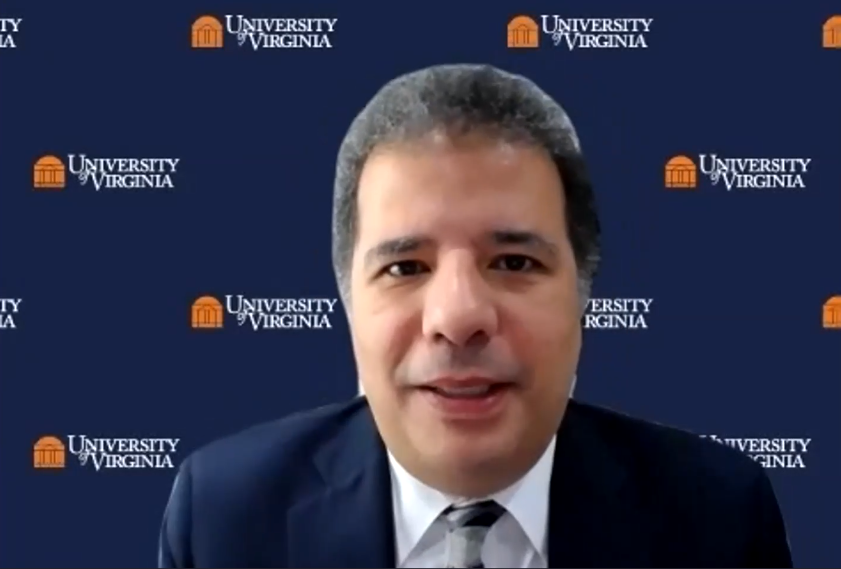
To succeed where the Constitution has failed
On Sept. 28, 2020, three people from across Virginia met to participate in a Zoom meeting, not unlike those many PVCC students will undoubtedly be familiar with after months of virtual classes. But the participants of this particular meeting were not students, and the topic of discussion was arguably more serious than chemistry or differential calculus. Director of Library Services Crystal Newell and Professor of Engish Dr. Tamara Whyte sat down with the Director of UVA’s Center for the Study of Race and Law, Kim Forde-Mazrui, to discuss the failure of the U.S. Constitution to ensure fair and equal policing for African-Americans and other minorities, who are subject to racial profiling and police brutality by law enforcement, the very organization that is supposed to protect them. Once the webinar officially began, Mazrui, a black man with greying hair and a gentle smile, spoke.
“Constitutional Law and Racial Justice are two courses that I teach,” he said. “And I think they actually go well [together] when it comes to criminal justice matters, because I think one of the most important functions of a constitution is to protect people who are least likely to be adequately valued by the majoritarian political process.”
“Historically, African Americans have been undervalued by the political process, and I think continue to be, although to a lesser degree than in the past,” he said. “Another group of people that are especially undervalued by the political process are criminal suspects. So without constitutional protections of both race and criminal justice, the political process would likely run roughshod over the rights of these two groups.”
The first section of Mazrui’s presentation focused on the 14th Amendment’s due process clause. The clause states, “no state shall deprive any person of life, liberty or property without due process of law.”
Mazuri began by talking about the “void for vagueness” doctrine, explaining that, according to said doctrine, any law that is too vague for a citizen to understand, and thus difficult for them to obey, is in violation of the doctrine and thus should be considered void.
“So the purpose of the void for vagueness doctrine is to guard against arbitrary and discriminatory law enforcement… and the idea here is police acting in good faith,” said Mazrui.
“The next tool to limit police profiling is the 4th Amendment, which is probably most directly relevant to police behavior,” said Mazrui. The relevant portion of the amendment reads, “the right of the people to be secure in their persons, houses, papers, and effects, shall not be violated,” Mazrui explained that the court’s interpretation of the amendment held that police officers must have reasonable suspicion that criminal activity is taking place before they can search a suspect.
“And the purpose here is to ensure that the police have a factual basis of criminal behavior before subjecting someone to coercive investigation, search, or arrest,” said Mazrui.
The third clause Mazrui mentioned was the Equal Protection clause. This clause states that “no state shall… deny to any person within its jurisdiction the equal protection of the laws.”
“In the context of police, the equal protection doctrine means that police must not use race as a factor in enforcing the law,” he said
Mazrui proceeded to explain the most crippling shortcomings of each clause and amendment.
“So, beginning with the due process clause failures… the problem here is what scholars call overcriminalization,” said Mazuri. Overcriminalization is the idea that laws defining criminal behavior have become excessively specific to the point where someone with no criminal intent could inadvertently break the law.
“Think of jaywalking, or speeding. We might be aware that it might be illegal, but it’s so under-enforced we don’t think it’s doing anything wrong,” he said.
Mazrui theorized that overcriminalization was in response to the void for vagueness doctrine.
“If legislators now can’t just pass these blanket, open ended laws like loitering or acting suspiciously… which can allow police to maintain order in the way the majority wants, they can pass a series of specific laws that can enable the police to do the same thing,” he said.
In the case of the 4th Amendment, the problem lies with reasonable suspicion.
“The courts used to require probable cause, but in Terry vs. Ohio, the court said that reasonable suspicion is accurate… and the problem is that it can apply to many different types of behaviors,” said Mazrui.
And the fatal flaw of the equal protection clause is that it relies on the plaintiff to provide proof that racial discrimination has taken place, which is a difficult task.
“What happens is that the Supreme Court requires the suspect or defendant to prove that identically situated white people, or people of other races… were treated differently” said Mazrui.
To conclude the webinar, Mazrui posited several potential solutions to these pressing issues. Mazrui thought that the best way to enact judicial and legislative reforms would be to re-interpret the problematic constitutional provisions. Mazrui next proposed a series of executive reforms, particularly for the police force. These included stricter hiring qualifications and reforming police culture as a whole.
“It’s a very warrior-like culture that views the street, in a sense, as an army that they are in a war with,” said Mazrui.
Most of all, Mazrui hoped that the government could find ways to address racial equality in society as a whole.
“Through education, economic investment, etc, that could in turn then reduce both the causes of crime and the causes of the biases that police and other people experience” said Mazrui.
This discussion took place as a part of PVCC’s One Book Program. You can find information on the One Book Program on the PVCC website. A recording of this webinar is also available at the PVCC website.






